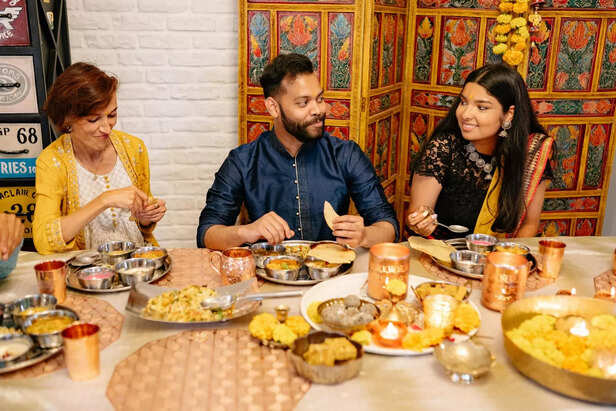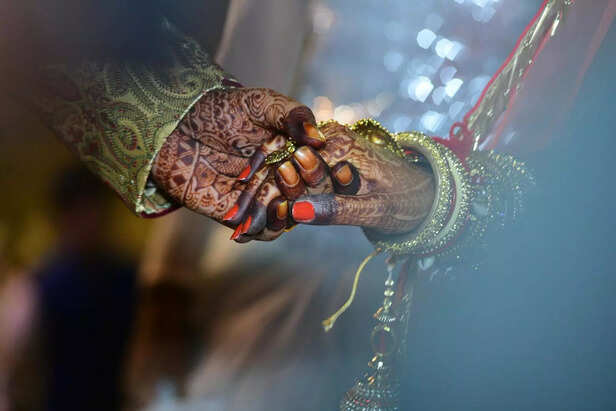The End of Arranged Marriages? Or Just the End of Silent Suffering?
Ankita Rai | Fri, 16 May 2025
Arranged marriages in India are undergoing a quiet transformation. While they were once rooted in duty and tradition, modern couples are increasingly prioritizing emotional compatibility, self-worth, and mutual respect. Rising separations—even among arranged matches—reflect a cultural shift where silence and sacrifice are no longer seen as virtues. Empowered by education, therapy, and changing social norms, individuals are redefining commitment. This isn’t the end of arranged marriages—it’s the end of forced endurance. What remains is a more conscious, compassionate version of partnership, where love is chosen, not commanded.
( Image credit : Pexels )
Photo:
For Indians for generations, marriage wasn't something you fell into. It was arranged—carefully, communally, culturally. Families sat down. Stars were consulted. Two individuals, mostly strangers to each other, stood alongside one another in a daze of jasmine and gold and took a leap of faith into a future defined more by habit than by personal desire. Love was never the beginning. It was the possibility. Something to become, if things worked out. But between yesterday's silence and today's awareness, something is shattering. Gently. Authentically. More and more couples—arranged or otherwise—are walking out on marriages that don't feel like home anymore. And perhaps, just perhaps, it isn't the institution that's collapsing. It's the lie that sticking around is always the right thing.

We were taught that marriage meant compromise. That love was optional, but duty wasn’t. That if something felt off, you’d learn to live with it. Adjust. Sacrifice. Smile through it. Especially in arranged marriages, where knowing someone for a few months—or sometimes just a few conversations—was enough to bind lifetimes. But today's generation? We've learned something different. Emotional language. Space. Self-respect. We know now that love isn't something to be begged for, or waited on for eternity. It's something to be mutual. Alive. Felt. And when it isn't? People are walking away. Not in anger. In clarity. In the quiet realization that life is too long to feel alone next to someone every day.

India's divorce rate remains at a mere 1%. But that statistic doesn't tell you about the inner worlds of contemporary marriages. It doesn't show you the couples who no longer talk. The ones living parallel lives. The ones who never divorced, yet psychologically checked out years ago. Behind the figures, the change is indisputable. Even so-called arranged marriages—the "safe," well-suited, astrologically-matched ones—are unraveling.
Why?
Because the pillars are shifting.
Women have choices now. Actual ones. Careers. Economic independence. Options. The kind that make you utter, "I don't have to suffer this." Human beings are awake emotionally. We've gone to therapy. Or at least heard the lingo of needs, boundaries, trauma, healing. We can label what feels missing. And naming it shifts everything. We don't fear judgment anymore. Or at least, not as much as we should to remain in a place where our souls feel stifled.

Even contemporary arranged marriages have positive start-ups—texts, dates, talks. Some even seem like love stories unfolding. But compatibility doesn't always develop with time. And at times, it never materializes. You attempt to remain. You make an effort. You query whether this is simply what married life is like. But you know, deep down—this isn't loneliness, it's absence. Absence of warmth, of kindness, of being understood. And gradually, you cease attempting. This is not rebellion. It's heartbreak. The gradual, silent sort.

Families used to not only arrange marriages, they kept them. Joint families meant common burdens. Fewer fissures. More interference. Or at least, more excuses to feign fine. But in current nuclear arrangements, couples are left alone. That freedom, although liberating, also highlights fissures more starkly. And for the first time, perhaps, some parents—urban, informed, and quietly proud—are voicing: "If it's not working, you don't have to stay." That's not failure. That's growth. But it still hurts. Leaving a marriage, and certainly one arranged by people you love, is guilt. It weighs on you. People whisper. You second-guess yourself. But when you select your peace over performance, you don't exit—you return to yourself.

Arranged marriages today come wrapped in PDFs, biodatas, and filtered Instagram handles. Compatibility is cross-checked via education, salary, surnames—and sometimes, sun signs. There’s more choice than ever. But also more chaos. We swipe, compare, overthink. We’re sold ideas of perfection. But behind every perfect match is still the real work of building something meaningful.
And when the reality hits—messy kitchens, mismatched values, unmet emotional needs—it’s not always a fairytale. Because gathering has become easy. Remaining? That's still the difficult bit.
Is This the

Not quite. What's dying isn't arranged marriage. It's the kind where your voice didn't count. Where you didn't have a say. Where love was something you could or couldn't choose, but didn't have to. And where silence was dignified. Modern arranged marriages are founded on something new: dialogue, agreement, interest. Parents are no longer dictators but facilitators. And couples are wondering: "Can I be myself with this individual?"
One question could be the revolution.
What Separations Are Really Telling Us
They're not a failure of culture. They're an awakening of self.
They're saying:
That emotional absence is no longer tolerable.
That mental well-being matters above social expectations.
That women are no longer shrinking to fit into someone else's idea of who they're supposed to be.
That marriage is no longer the end goal—it's just one type of partnership. And it has to feel that way.
A place where love feels like freedom, not a favor. A connection where you can speak and be heard. Hurt and still feel held. Leave and still be respected. The dissolution of a marriage—arranged or not—isn't the dissolution of love. It's another form of beginning.
The type where you return home to yourself, whole. Because perhaps, perhaps most, the most courageous thing you can do with love—is to listen to your own heart.
Unlock insightful tips and inspiration on personal growth, productivity, and well-being. Stay motivated and updated with the latest at My Life XP.
From "You'll Adjust" to "I Deserve More"

relationship problems
( Image credit : Pexels )
We were taught that marriage meant compromise. That love was optional, but duty wasn’t. That if something felt off, you’d learn to live with it. Adjust. Sacrifice. Smile through it. Especially in arranged marriages, where knowing someone for a few months—or sometimes just a few conversations—was enough to bind lifetimes. But today's generation? We've learned something different. Emotional language. Space. Self-respect. We know now that love isn't something to be begged for, or waited on for eternity. It's something to be mutual. Alive. Felt. And when it isn't? People are walking away. Not in anger. In clarity. In the quiet realization that life is too long to feel alone next to someone every day.
When the Numbers Don't Speak the Truth

divorce
( Image credit : Pexels )
India's divorce rate remains at a mere 1%. But that statistic doesn't tell you about the inner worlds of contemporary marriages. It doesn't show you the couples who no longer talk. The ones living parallel lives. The ones who never divorced, yet psychologically checked out years ago. Behind the figures, the change is indisputable. Even so-called arranged marriages—the "safe," well-suited, astrologically-matched ones—are unraveling.
Why?
Because the pillars are shifting.
Women have choices now. Actual ones. Careers. Economic independence. Options. The kind that make you utter, "I don't have to suffer this." Human beings are awake emotionally. We've gone to therapy. Or at least heard the lingo of needs, boundaries, trauma, healing. We can label what feels missing. And naming it shifts everything. We don't fear judgment anymore. Or at least, not as much as we should to remain in a place where our souls feel stifled.
When Love Doesn't Land—and Silence Becomes a Soundtrack

relationship
( Image credit : Pexels )
Even contemporary arranged marriages have positive start-ups—texts, dates, talks. Some even seem like love stories unfolding. But compatibility doesn't always develop with time. And at times, it never materializes. You attempt to remain. You make an effort. You query whether this is simply what married life is like. But you know, deep down—this isn't loneliness, it's absence. Absence of warmth, of kindness, of being understood. And gradually, you cease attempting. This is not rebellion. It's heartbreak. The gradual, silent sort.
The Family Role Is Evolving, Too

family plays a crucial role
( Image credit : Pexels )
Families used to not only arrange marriages, they kept them. Joint families meant common burdens. Fewer fissures. More interference. Or at least, more excuses to feign fine. But in current nuclear arrangements, couples are left alone. That freedom, although liberating, also highlights fissures more starkly. And for the first time, perhaps, some parents—urban, informed, and quietly proud—are voicing: "If it's not working, you don't have to stay." That's not failure. That's growth. But it still hurts. Leaving a marriage, and certainly one arranged by people you love, is guilt. It weighs on you. People whisper. You second-guess yourself. But when you select your peace over performance, you don't exit—you return to yourself.
Tech Changed the Game—But Not Always for the Better

Technology is killing the relationship
( Image credit : Pexels )
Arranged marriages today come wrapped in PDFs, biodatas, and filtered Instagram handles. Compatibility is cross-checked via education, salary, surnames—and sometimes, sun signs. There’s more choice than ever. But also more chaos. We swipe, compare, overthink. We’re sold ideas of perfection. But behind every perfect match is still the real work of building something meaningful.
And when the reality hits—messy kitchens, mismatched values, unmet emotional needs—it’s not always a fairytale. Because gathering has become easy. Remaining? That's still the difficult bit.
Is This the End of Arranged Marriages ?

is it really the end of arrange marriage?
( Image credit : Pexels )
Not quite. What's dying isn't arranged marriage. It's the kind where your voice didn't count. Where you didn't have a say. Where love was something you could or couldn't choose, but didn't have to. And where silence was dignified. Modern arranged marriages are founded on something new: dialogue, agreement, interest. Parents are no longer dictators but facilitators. And couples are wondering: "Can I be myself with this individual?"
One question could be the revolution.
What Separations Are Really Telling Us
They're not a failure of culture. They're an awakening of self.
They're saying:
That emotional absence is no longer tolerable.
That mental well-being matters above social expectations.
That women are no longer shrinking to fit into someone else's idea of who they're supposed to be.
That marriage is no longer the end goal—it's just one type of partnership. And it has to feel that way.
In the End, What We All Want Is Simple
A place where love feels like freedom, not a favor. A connection where you can speak and be heard. Hurt and still feel held. Leave and still be respected. The dissolution of a marriage—arranged or not—isn't the dissolution of love. It's another form of beginning.
The type where you return home to yourself, whole. Because perhaps, perhaps most, the most courageous thing you can do with love—is to listen to your own heart.
Unlock insightful tips and inspiration on personal growth, productivity, and well-being. Stay motivated and updated with the latest at My Life XP.
Frequently Asked Questions (FAQs)
- Are arranged marriages really ending in India?No, they're evolving—now with more choice, consent, and emotional awareness.
- Why are more arranged marriages ending today?Because people, especially women, are prioritizing emotional well-being over societal expectations.
- Is choosing separation in an arranged marriage a failure?Not at all—it's a courageous act of self-respect and honesty.









